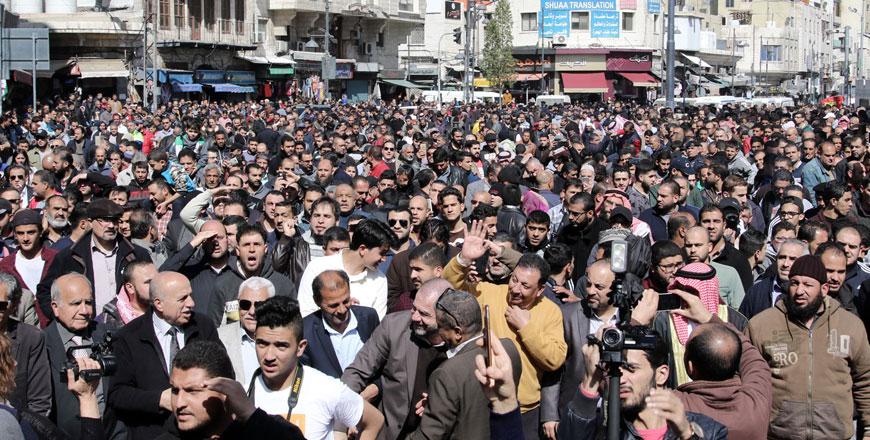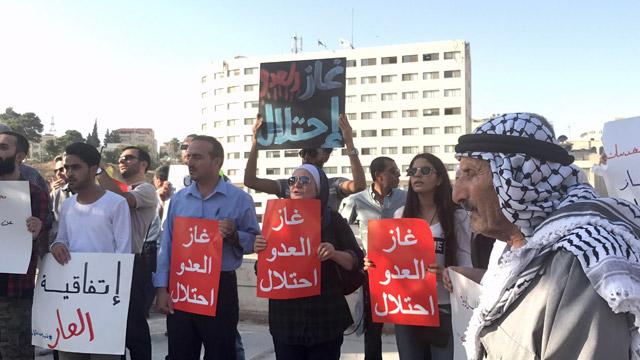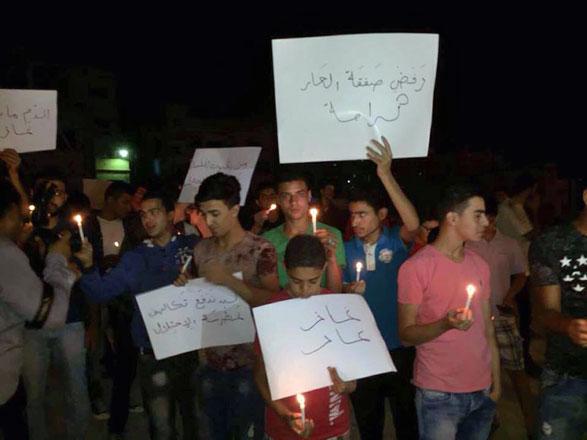You are here
2017 to see action against ‘normalisation’ of ties with Israel, activists say
By Suzanna Goussous - Feb 25,2017 - Last updated at Feb 25,2017

Protesters demonstrate against price hikes in downtown Amman on Friday (Photo by Osama Aqarbeh)
AMMAN — Activists have vowed that 2017 will be a year of “increased activism” against Jordanian normalisation of ties with Israel, with a particular focus on the two countries’ recent gas deal.
Activists from anti-normalisation campaigns have marked the beginning of what they predict will be an “eventful year” of activism, aimed at cancelling the gas deal with Israel and forcing the resignation of the government.
They said 2017 will be a period of concerted “anti-normalisation” activities which Jordanians from all backgrounds engage in, including protests against the gas deal, both on campuses and in the streets.
Last year, the government said the agreement with Noble Energy, a Houston-based company that holds the largest share in the Israeli Leviathan gas field, will cover “40 per cent of the Kingdom’s needs of gas and save around $600 million annually”.
The National Electric Power Company says the deal would “save Jordan up to $600 million each year” and around 300 million cubic feet would be imported daily.
Mohammad Absi, head of the anti-normalisation campaign, said the normalisation process started in 1994, when the government signed the Wadi Araba peace treaty with Israel.
“Despite [consecutive] governments promoting and reinforcing the idea of normalisation, people had the choice to ignore it. But with the gas deal, people do not have that choice anymore,” he told The Jordan Times in a recent interview.
After collecting signatures for a petition in Amman, Irbid, Karak and Balqa, and organising demonstrations to voice “the people’s rejection of normalisation”, Absi said the campaign will highlight issues related to the Jordanian workforce in Eilat, in order to protest normalised relations with Israel.
“2016 was a year that saw normalisation thoroughly endorsed, with many documents and papers promoting engaging in trade and tourism with the Zionists. This year, we aim to increase efforts to cancel the gas deal signed with the Israeli government,” he added.
Hisham Bustani, director of the Jordanian National Campaign against the Gas Agreement with the Zionist Entity and the “Enemy’s Gas Is Occupation”, suggested the Aqaba Liquefied Petroleum Gas Terminal, which exports gas to other areas in Jordan, could be an alternative to the gas deal with Israel.
The terminal, inaugurated in mid 2015, which stores imported liquefied gas, supplies electricity-generating stations throughout the Kingdom.
Speaking at an event held by activist groups in Amman late last week, Bustani said Jordan’s need for gas will decrease over the coming years, as the country will develop more projects focusing on renewable energy and oil shale.
“We are importing gas that we do not need and paying billions to an enemy,” he said.
Anas Hussein, director of the Student Coalition for the Cancellation of the Gas Deal, said the peace treaty signed 23 years ago by the governments of Jordan and Israel paved the way for the promotion of more normalisation projects between both countries.
“Believing in the role of students and the effectiveness of their actions in the local community, under the student coalition, we started many campaigns to cancel the gas deal,” he added.
“The only way to reject normalisation is to continue what we started; to have an influence on the public through different mediums, in addition to raising the public’s awareness, and not only members of the student body, but the whole community,” Hussein said.
As part of a series of events planned this year, activists from different political parties on Friday organised a march in front of Al Husseini Mosque in downtown Amman to protest recent price hikes and the gas deal.
Activists chanted slogans demanding the resignation of the government, and the creation of “a national rescue government” to tackle the country’s problems and usher in reforms.
The protest saw leftist and Islamist groups march in two separate blocs, with both groups having their own chants and sets of demands. Activist Ahmad Fathi told The Jordan Times that such division in protests “creates chaos and delay”.
Similar protests against price hikes were held across the Kingdom.
Related Articles
AMMAN — Jordanian activists on Tuesday decried “Parliament’s silence” over the gas deal with Israel which was signed by the state-owned Nati
AMMAN — Almost six months after the state-owned electricity company signed the gas deal with Israel, activists are still taking to the stree
AMMAN — For the second time in two weeks, Jordanians on Sunday turned off their lights to protest the deal that the National Electric Power















